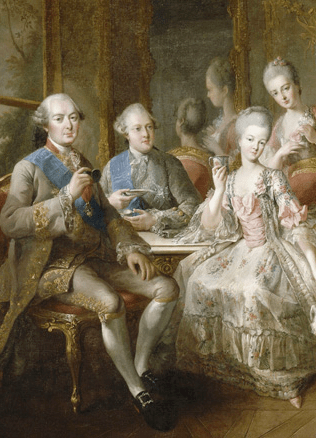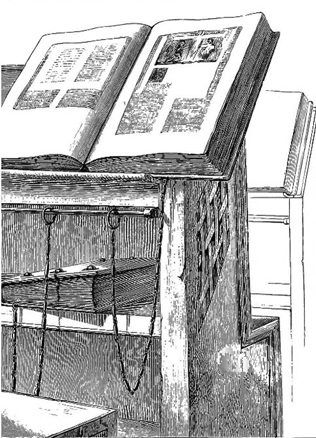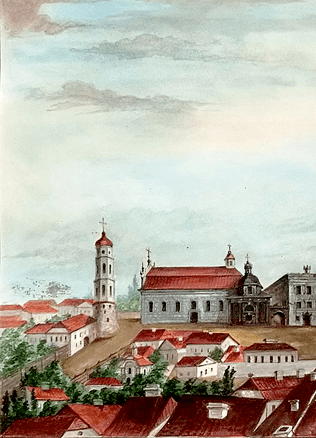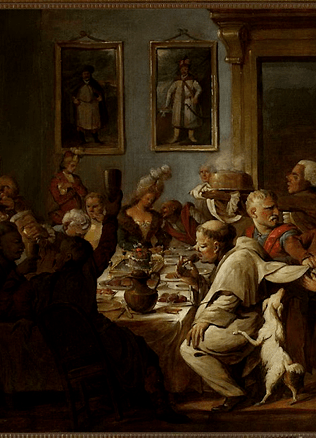Paid and unpaid offices
It was only in the 18th century that monetary remuneration to the officials from the Treasury of the State became established. However, following the old procedure and traditions, some part of the officials were further paid salaries from the incomes derived from the state holdings. For example, the artillery General of the Grand Duchy of Lithuania was given Geranainiai and Lipniškiai holdings for his service from the income of which he did not only replenish his personal income but also had to ensure the provision of the artillery of the Grand Duchy of Lithuania. Vilnius economy was placed at the disposal of Vilnius Voivode for his service from the income of which he paid monetary salaries to the official of the lower rank of the palatine.
The beginning of the creation of central institutions and the mechanism of bureaucracy in the Grand Duchy of Lithuania signified changes. The Treasury and Military Commissions of the Grand Duchy of Lithuania were established in 1764 and their officials (senators, noblemen) were paid monetary salaries from the Treasury of the State. Changes in the State started with administration of the Treasury and the army. When the Standing Council was established in 1775, a circle of the paid central officials and the area of their activities including the spheres of supervising work of education, police, courts and foreign policy, expanded.
Whose salary was the largest?
The Law that established continuous service provided for the remuneration for work in that service. The Marshal of the continuous service was paid the annual salary of 30 000 gold roubles, and members of the Standing Council from the nobility estate received the annual salary of 14 000 gold roubles. The salaries of the members of the Council of the Departments differed. The Great Grand Duchy of Lithuania Hetman received the largest salary of all the members of the Military Department (60 000 gold roubles), the Field Hetman received 40 000, and the noblemen commissars received the salary of 8 000 gold roubles. The Great Treasurer of Lithuania at the Treasury Department received a salary of as much as 120 000 gold roubles, the Treasurer of the court received 80 000 gold roubles, and the commissars were paid a salary of 8 000 gold roubles from the Treasury of the State. The size of the salary of each official was determined not only by his office but also by his participation in the sitting of the Standing Council and its Departments. The official who missed the sittings received a proportionally smaller salary than established.
The size of salaries was established for the employees of the Chancery too. Equal salary was set only for the Commissars of separate departments and the employees of the main chanceries. For example, five officials of the central Chancery of the Police Department, similarly to other departments, according to their office and importance, received from 1 334 to 5 000 gild roubles of an annual salary.
Though the funds allocated to paying salaries were small, salaries to the officials of the chanceries were often delayed.
Due to inflation in the 80s of the 18th century, salaries of some officials were increased. Legislative Protection and the commissions subordinate to it, which replaced the departments, were founded in 1791–1792, and between 1793 and 1794 the Standing Council and the commissions subordinate to it operated. The state administration structure did not change considerably; it was only the number of the officials, their specialisation, and the size of the salaries of the officials that fluctuated.
The policemen had to take the oath not to profit “on the side”
In the 70s – 80s of the 18th century salaries from the Treasury of the State were paid only to the Army and the officials of the Treasury Department: regents, superintendents, intendants, inspectors, clerks, archivists (accordance to the importance of their position– from 600 to 5 000 gold roubles). The administration of the Police Department was not extended on account of a lack of the funds. Funds were provided for and the reforms started only in 1791–1792, later they were continued in 1793–1794.
When economising on the funds, salaries of the greatest part of the officials decreased.
In 1775, salaries were provided for all the officials of the Standing Council and its Departments but in 1793, after the division of the Polish-Lithuanian Commonwealth, when the territory of the State (as well as its income) decreased, salaries were abolished for some part of the senators who had other income, and they were cut for other officials too.
The salary received had to curb self-will of the officials and block the way to profiting from one’s office. In 1791, the employees of the Legislation Protection Chancery had to swear that they “will not take any salary from aside.” The instruction of 1792 underlined that a police guard (his annual salary was 1 200 gold roubles), in receiving a salary from the state could not take anything from the inhabitants and the state either for himself, his people or his horse, could not receive any other remuneration – only the set state salary. Furthermore, the instruction said that a police guard had to acquire the uniform, armament and a horse from his own salary.
Money for some, honour for others
Contrary to the officials of the central institutions and their divisions, the officials of the newly established local institutions had to receive salaries from the incomes of the towns and districts rather than from the Treasury of the State.
The central institutions understood that seeking to achieve efficiency of the work of local institutions it was necessary to provide for salaries to the noblemen who performed responsible duties of commissars, however, there was a lack of funds in the State.
Neither economically weak small towns nor districts were able to maintain large local administrations (districts and cities) therefore salaries were provided for to the employees of the chanceries of the institutions only. In 1789, the Law on Civil Military Commissions specified the following: “We want to treat these labour-intensive duties, which are performed free of charge as civil merits.” In 1793, the Law on Civil Military Commissions confirmed that work in the commissions was “very important from the civil point of view but it was not remunerated” and added that a nobleman who worked in the Commission for four years would gain advantage over the noblemen if he sought higher state positions. In this way career possibilities were underlined.
Empty budgets of the towns
Salaries of the employees of the town magistracies also raised problems. This issue was not resolved until the end of the 1791–1792 reforms. Income of the towns were not large (Vilnius income totalled about 40 000 gold roubles, those of Kaunas amounted to about 20 000 gold roubles of annual income), therefore the problem was put off to the future expecting to replenish the incomes of the towns. Like the officials of the palatines and districts, town prefects, burgomasters and assessors most often received income from the town holdings. Having no decision of the Police Commissariat of the Polish-Lithuanian Commonwealth, in May 1792 the officials of Kaunas Magistracy proposed and asked to approve the annual salaries that they set to the officials of self-government: 3000 gold roubles to the prefect, 2 000 gold roubles to four assessors, the clerk, the cashier each, 500 gold roubles to the assistant of the clerk applicant, 600 gold roubles to the Police procurator and the procurator of the orphans, minors and widows, and 400 gold roubles to a messenger, builder, steward, forester and a quartermaster (a total of 20 700 gold roubles).
A total amount provided for the salaries of the self-government officials coincided with the annual income of the town therefore the Commission did not approve of this request of the Police.
Impoverished employees of Vilnius
With separate commissions operating in Poland and Lithuania, it was quite often that salaries of the Lithuanian officials were lower. The Police Commission of the Polish-Lithuanian Commonwealth asked the Standing Council to make the salaries of the Lithuanian Commissars equal with the salaries of the Polish commissars, demanded that delayed salaries should be paid at least to the employees of the Chancery.
The Commissars complained that prices were very high in Vilnius therefore the Chancery employees whose source of sustenance was their salary could not make a living, they threatened to quit their jobs in the Commission, demanded that small salaries should be paid without delay.
Do You Know?
Having introduced monatery salaries to the officials at the end of the 18th century it was expected to curb self-will of the officials and block the way to profiting from one’s office. In 1791, the employees of the Legislation Protection Chancery had to swear that they “would not profit from aside.” The instruction of 1792 underlined that a police guard (annual salary was 1 200 gold roubles), in receiving a salary from the state, could not take anything from the inhabitants and the state either for himself, his people or his horse.
The issues of the size of the salaries were especially burning in the capital city. For example, Mikalojus Deslevertas, Major of the private military unit of Vilnius Voivode Karol Stanisław Radziwiłł, explained to Vilnius Voivode that “it was impossible to subsist on the annual salary of 1 400 gold roubles especially in Vilnius”. In the same year he repeated his request to raise the salary or give him an additional position for an additional salary: “In Vilnius, where everything is expensive, besides, where one has to be clean every day, I am not in position to maintain my wife and children”.
Liudas Glemža



